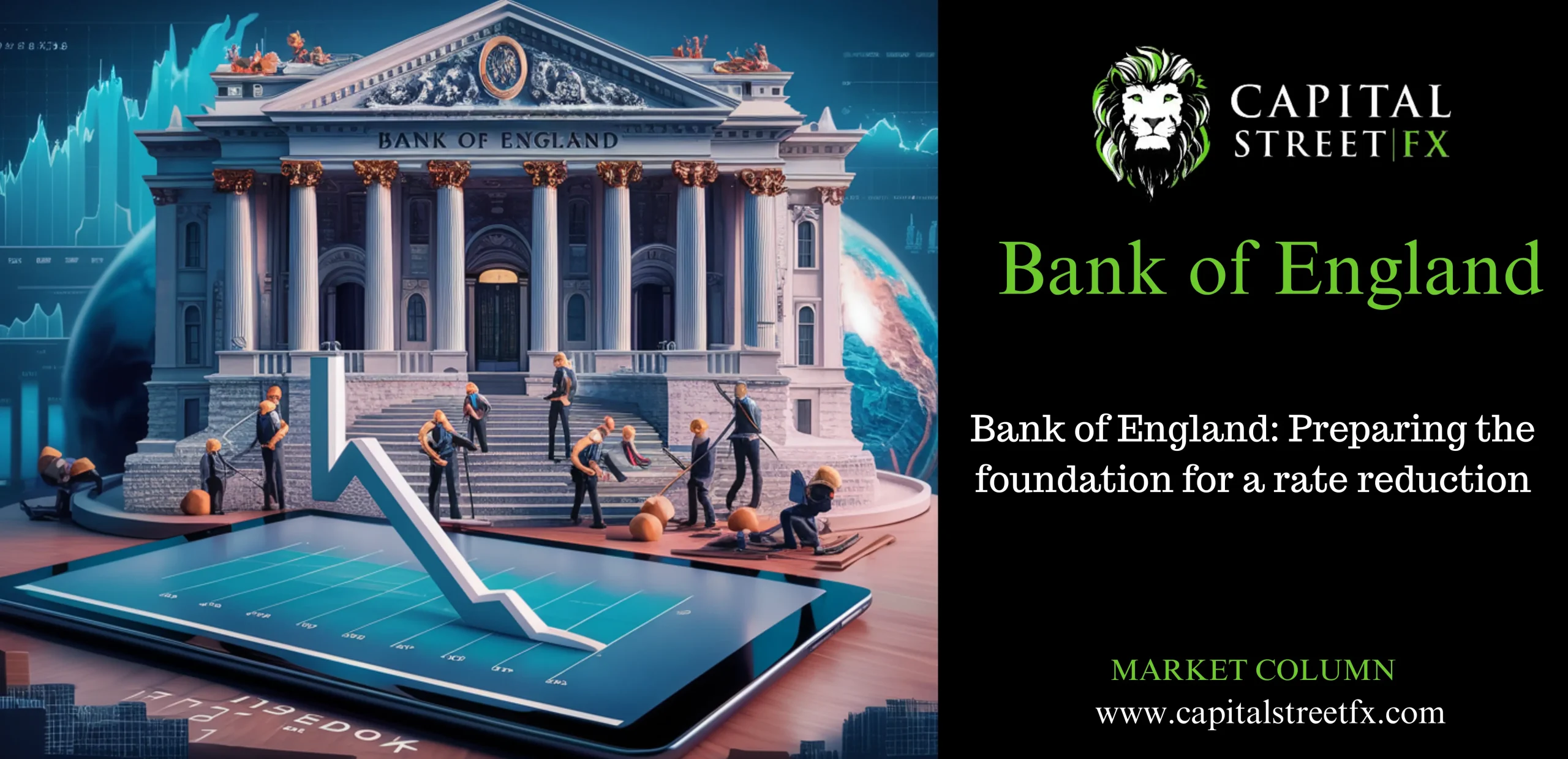Bank of England: Preparing the foundation for a rate reduction
On Thursday at Midday, the Bank of England will issue its second Monetary Policy Report for the year. Alongside revealing their decision on interest rates, they will present their most recent economic analysis and inflation projections. The report holds significance as it serves as a guide for upcoming policy choices and can significantly influence asset prices in the UK.
At this meeting, it’s anticipated that the Bank of England (BOE) will maintain interest rates, shifting the focus instead to short and long-term economic and inflation projections. Market observers will be keen to gauge how the inflation outlook has evolved since the last report in February. At that time, the BOE had revised down its median CPI inflation forecasts for 2024 to 3.7%, a decrease from 4.4% in November, with an expectation for inflation to recede to 3% by 2025. The BOE didn’t anticipate inflation reaching its 2% annual target rate until 2027. In February, the BOE highlighted expectations for volatile inflation in 2024. While April’s inflation figures are due for release on May 22nd, potentially revealing a drop to 2%, the BOE foresees inflation rebounding later in the year. Additionally, the BOE cautioned that another shock could trigger a significant inflationary surge.
The market will be keen to observe whether the BOE expresses increased confidence regarding the inflation outlook at this meeting, given two recent developments: First, the moderation of oil prices back to the low $80s, with Brent crude currently trading at $82 per barrel, marking an 8% decrease over the past month. Second, the absence thus far of any external inflationary shocks exerts upward pressure on energy prices. However, wage growth, which remains high at 6%, albeit having decreased significantly, remains a concern. Given that wages are a significant driver of inflation, the BOE is likely to maintain a cautious stance on the inflation outlook, despite recent progress. For instance, March saw UK inflation dropping to 3.2%, notably below the BOE’s current median target of 3.7% for the entire year. Consequently, the BOE could be justified in revising its inflation forecast for this year in the upcoming report.
The BOE’s policy decisions are anchored on the premise of inflation reverting to 2% in the medium term. Consequently, longer-term inflation projections hold significance. If the BOE advances its projection of achieving the 2% inflation target to 2026, currently set at 2027, it could be interpreted as a dovish indication, potentially paving the way for a rate cut in the summer. Additionally, the BOE will unveil their GDP forecasts. While the economy is anticipated to rebound in Q1 after experiencing a mild recession toward the end of 2023, economists hold a more optimistic view of the UK economy compared to the BOE. Although the BOE’s February GDP forecasts were downwardly revised to 0% for Q1, it is anticipated that growth will be at 0.4% upon its release later this week. Consequently, there is a strong likelihood of the BOE revising its GDP forecasts as well.
An enhancement in GDP coupled with a reduction in CPI would represent an ideal scenario for the UK economy, akin to the “Goldilocks” situation. This combination would indicate that the UK economy is on track to achieve a smooth economic transition.
Recent speeches from MPC members indicate a divergence of opinions within the Bank, hinting at a potential shift towards a more accommodative stance. Jonathan Haskel, who previously advocated for a rate hike, now suggests that the timing of a rate cut hinges on the ratio of vacancies to the unemployment rate, which has decreased by 30% from its peak. His acknowledgment of well-anchored inflation expectations signals a departure from his previous hawkish stance. Governor Andrew Bailey stated that the UK is experiencing deflationary pressures despite full employment, a sentiment echoed by new members Megan Greene and Huw Pill, who caution against premature rate cuts followed by subsequent hikes. Notably, recent speeches from BOE members have not emphasized high inflation levels or immediate rate hikes. The vote split on Thursday will be telling, with a potential 7-2 split favoring the status quo, yet two members advocating for a cut, indicating a potential move towards a rate reduction later this year.

